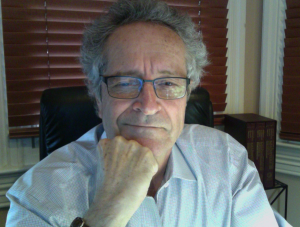Why I’ve (Almost) Given Up
Why I’ve (Almost) Given Up
 Phillip M. Sinaikin, M.D., M.A. (retired), Board Certified in Psychiatry
Phillip M. Sinaikin, M.D., M.A. (retired), Board Certified in Psychiatry
Earlier this year I participated in an online symposium sponsored by the East Side Institute in New York City. Among the participants was Robert Whitaker, author of Mad in America1 and other excellent books and articles critical of medical model psychiatry. He has probably drawn more attention to this topic than anyone and has lectured all over the world. And yet during this symposium Robert clearly expressed a sense of demoralization because, as he put it, despite his and so many others’ detailed, rational and inarguable critiques of medical model DSM psychiatry “the needle hasn’t moved even a little bit.”
I too have been an active member and participant in the critical psychiatry movement while practicing clinical psychiatry for over 30 years. I have lectured, written and published in mainstream and radical literature as well as putting all my thoughts together in a 375-page book published in 2010: Psychiatryland2. I too have not seen the needle move at all or, if it has, even further in the wrong direction toward speculative functional neurobiology justifying even more diagnoses and crazy combination psychotropic medication treatment plans.
I will be honest, it was with a great sense of relief that I retired about a year ago from active practice and really haven’t looked back. But that doesn’t mean things don’t still bug the hell out of me and occasionally prompt me to spring into action. Case in point, the political and public reaction to the Parkland school shootings. Once again, I witnessed an outcry for more mental health evaluations of children and teens to make early diagnoses of mental disorders and impose treatment that will prevent future mass shootings. In addition, while there was (briefly) a discussion about background checks for gun ownership being denied for the “mentally ill” I decided I needed to speak up. But how? Oh, I know, write an op-ed piece for a major newspaper. That should do the trick and get an important discussion going. Or so I thought….
Without going into too much detail you need to know that it seems a whole lot of people feel the need to publish op-ed opinions in major newspapers. So many in fact that the papers have all kinds of rules governing submission including the maximum number of words, topics, and whether they will even acknowledge receiving the article and that they won’t get back to you. “If you don’t hear from us in three weeks you should assume we have elected not to publish it.”
Undaunted, I decided to go ahead, shaving down the word number when required and waiting the requisite three weeks between submissions. Here is a list of the papers I never heard back from: The New York Times, The Washington Post, The Wall Street Journal, USA Today, The Miami Herald, The Los Angeles Times, The Chicago Tribune and The Pittsburgh Press. Because I live here and could call and bug them on the phone, I did get some feedback from The Tampa Bay Times. They “passed” on the article because they saw the issue I was presenting as an internal debate in psychiatry, not an issue of urgent national concern.
So, there you have it. Another non-movement of the needle. Chuck Ruby has asked for submissions to the ISEPP Bulletin so the following is the text of my op-ed article that never saw the light of day.
1 Whitaker, R. (2003). Mad In America: Bad Science, Bad Medicine, and the Enduring Mistreatment of the Mentally Ill. New York, NY: Basic Books.
2Sinaikin, P. (2010). Psychiatryland: How to Protect Yourself from Pill-Pushing Psychiatrists and Develop a Personal Plan for Optimal Mental Health. IUniverse.
Who decides who is too “mentally ill” to buy a gun?
As an M.D. psychiatrist who recently retired after 33 years of work in diverse clinical settings, I am deeply concerned about the role being assigned to mental health professionals in the various proposals to end mass shootings in our schools and other public places. It seems as if the American public and policy makers continue to believe that psychiatry is a medical specialty comparable to other medical specialties such as internal medicine or oncology. It is mistakenly believed that when a patient is given a psychiatric diagnosis of, for example, bipolar disorder or ADD it represents a scientific certainty, no different from a diagnosis of diabetes, heart disease, cancer or an infection made in other medical specialties. But this is simply not the case.
Diagnoses in mental health are derived from the Diagnostic and Statistical Manual of Mental Disorders, currently in its fifth revision, the DSM 5. Deciding whether someone is or is not mentally ill, (or, technically, has a “mental disorder”), and what precisely that mental disorder is relies solely on referring to the diagnostic criteria listed in the DSM. These criteria are lists of signs (observable symptoms such as motor restlessness), and subjectively reported symptoms such as feeling depressed or anxious or confused. Some of the most serious symptoms in psychiatry such as delusions, hallucinations or suicidal ideation are of the subjective variety and therefore prone to individual interpretation, variation and distortion.
When these symptoms and signs occur in specified clusters and are of sufficient duration and intensity, they “qualify” the patient for a particular mental disorder diagnosis. How this differs from all the other medical specialties is that in internal medicine, oncology, orthopedics and the rest, the initial diagnostic assessment of signs and symptoms is merely step one. What comes next is a battery of objective tests such as X-Rays, blood tests or biopsies to confirm the initial diagnostic impression or prove it wrong. In psychiatry, this second round of testing does not occur (other than to rule out a physical cause such as a tumor or infection causing the mental symptoms). That is because in psychiatry THERE ARE NO OBJECTIVE LAB, X-RAY OR ANY OTHER DIAGNOSTIC TESTS TO PROVE OR DISPROVE A PSYCHIATRIC DIAGNOSIS.
In psychiatry, diagnoses are made by the clinician based solely on the clinical exam and DSM criteria alone. What that means is that there is a lot of room for varying “expert” opinions in mental illness diagnosis because there are no objective and inarguable biologic tests to prove (or disprove) a DSM derived psychiatric opinion about the correct diagnosis. A misbehaving difficult child could potentially be diagnosed as suffering from bipolar disorder or from ADD or from oppositional defiant disorder or from “depression” or even from a brand new mental disorder just added in DSM 5: DMDD, Disruptive Mood Dysregulation Disorder. Am I saying that the same child with the same “symptoms” could in fact be diagnosed with any of these widely divergent mental “disorders” depending solely on the clinical opinion of the examining psychiatrist and his or her interpretation of the presenting symptoms and the DSM criteria? Yes, that is exactly what I am saying because I have seen it time and time again in my 33 years of practice.
Although most people have been led to believe that an imbalance in brain chemicals or faulty brain circuit wiring is the underlying cause of mental illness this has never been irrefutably demonstrated in any human being to be the case, despite decades of intense research. There are no definitive biologic tests of any sort to reliably diagnose the exact nature of or cause of a mental illness from the mildest to most severe conditions. So how can we trust psychiatry to play a pivotal role in determining who is mentally ill, what precisely is wrong, what treatment is indicated and what is the prognosis? We can’t! So how should medical model psychiatry be asked to determine who can safely be allowed to own a gun?
From what I’ve read, the Parkland shooter had accumulated three widely divergent mental illness diagnoses: ADD, autism and generically described “depression.” Each of these “disorders” has its own course, treatment recommendations and prognosis. How to deal with all three at once? The Sandy Hook shooter had reportedly also received mental health evaluations and treatment with diagnoses of Asperger’s syndrome (in DSM 5 now autism spectrum), depression, anxiety and obsessive-compulsive disorder. Again, what to treat? How to treat? And, does this make someone dangerous? Should anyone with these diagnoses be kept from purchasing a gun?
In my experience, the ever-evolving, fluid and yes, still highly controversial, medical model in psychiatry is resulting in more than one mental illness diagnosis at a time becoming the norm, not the exception. And since psychiatry utilizes only about 5 classes of medications in treating the over 300 identified mental disorders in DSM 5, patients are frequently subjected to numerous medication trials and complex medication combinations, often with ambiguous results.
Medical model psychiatry is not, as yet, anything like the other branches of medicine. It is far from an exact science, in fact one could reasonably argue that it is not a science at all. I am not saying psychiatry never does anybody any good. Far from it. Psychiatrists deal with some very difficult and disturbed human beings and tries to do its best to relieve emotional pain and suffering. In addition there are numerous other disciplines such as social work, psychology and counseling to help people with emotional and behavioral problems. But most often it is the M.D. psychiatrist who has the final authority in assessing diagnosis and potential for danger to self or others. But psychiatry cannot and should not be relied upon to somehow objectively and scientifically weed out the “mentally ill” who represent a threat of mass violence and therefore would be disqualified from owning a gun. Many mental illness diagnoses refer to mild often transient emotional and behavioral disturbances, many of which might not even merit a mental disorder diagnosis, but due to insurance regulations and the requirement for a “reimbursable DSM diagnosis” to pay for mental health care, a diagnosis is nevertheless assigned. But even in the more severe conditions, violence is rare. Society needs to stop trying to fall back on the current mental illness model to predict who will become a mass shooter. We need to look elsewhere (social conditions, gun ownership laws) because current DSM medical model psychiatry won’t be of any real help.



 Al Galves, Ph.D.
Al Galves, Ph.D. “The reproducibility of published experiments is the foundation of science. No reproducibility – no science." - Moshe Pritsker, Ph.D., CEO of JoVE1
“The reproducibility of published experiments is the foundation of science. No reproducibility – no science." - Moshe Pritsker, Ph.D., CEO of JoVE1 Wayne Ramsay, J.D.
Wayne Ramsay, J.D.
 Bruce Pardy, Professor of Law, Queen's University
Bruce Pardy, Professor of Law, Queen's University